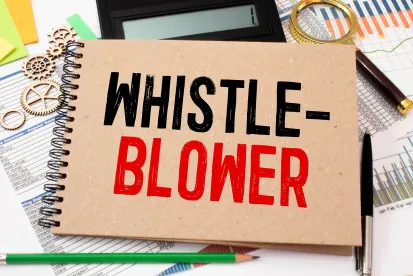For the second year in a row, New York has passed new legislation expanding protection for whistleblowers, likely in response to the prevalence of both whistleblowing and retaliation in the era of COVID-19. Until these amendments, whistleblowers enjoyed relatively scant protection under New York state laws, and relied primarily on the panoply of federal laws protecting whistleblowers from retaliation. But the combined 2020 and 2021 amendments to the New York Whistleblower Law (New York Labor Law Section 740 et seq.) improve protections for New York whistleblowers in a number of ways, including by: protecting a wider array of workers, broadening the scope of “protected activity,” expanding the definition of a prohibited retaliatory action, lengthening the statute of limitations, and requiring employers to notify employees of their whistleblower protections. These amendments have important implications for both employees and employers.
2020 Amendments Affecting Healthcare Whistleblowers
Before the recent amendments to New York Labor Law Sections 740 and 741, healthcare workers who blew the whistle on their employers in New York were only protected from retaliation if they complained about an actual violation of the law and that violation presented a “substantial and specific danger to the public health and safety,” “health care fraud,” or “improper quality of patient care.” An employee complaining of a wide range of illegal activities that did not directly affect public health or safety could be at risk for retaliation with little protection in law. For example, medical personnel who posted on social media about lack of personal protective equipment to protect from COVID-19 were not protected from employer retaliation under the old law.
In June 2020, New York enacted S.B. 8397A, which specifically expanded protections for healthcare whistleblowers in New York (New York Labor Law Section 741). The new law expanded the scope of protected activity to include an employee complaint of “improper quality of workplace safety,” where such violation “relates to matters which may present an unsafe workplace environment or risk of employee safety or a significant threat to the health of a specific employee.” The amended law also protects employees from retaliatory action if they complain to the press or on social media about “improper quality of workplace safety.”
The 2020 amendments, signed into law during the early months of the COVID-19 outbreak, were specifically intended to expand protections for healthcare whistleblowers. The bill’s sponsors wrote that the new legislation would “provide medical professionals with greater whistleblower protections, so that they are able to speak more freely about the conditions of the people that they are trying to care for.” S.B. 8397A.
2021 Amendments: S.B. 4394A
While the 2020 amendments were a positive step for whistleblowers, the broader New York Whistleblower Law (New York Labor Law Section 740) still failed to properly protect whistleblowers complaining of a wide range of illegal activities that did not directly affect public health or safety, or the “quality of workplace safety,” including activities such as tax evasion and sexual harassment. On October 28, 2021, New York Governor Kathy Hochul signed into law another series of amendments (S.B. 4394A) significantly expanding state law protections for all whistleblowers in New York, not just healthcare whistleblowers (see New York Labor Law Section 740 and 741).
Broadly speaking, the New York Whistleblower Law protects employees from “retaliatory action[s]” from their employer if they engage in a protected activity listed in the law. The changes to the law, which go into effect on January 26, 2022, are much more comprehensive and expansive than those from the 2020 amendments in S.B. 8397A to the healthcare whistleblower law, and include:
-
Expansion of who is protected under the law
-
Expansion of what constitutes protected activity
-
Expansion of what constitutes prohibited retaliation by the employer
-
Issuance of employer notification requirements
-
Lengthening of statute of limitations and expansion of right to a jury trial
-
Expansion of available remedies
-
Who is Protected Against Retaliation
The new law expands the scope of who is protected under New York Labor Law Section 740. Previously, “employee” included only current employees; the amendments expand the law to include current and former employees, as well as “natural persons employed as independent contractors,” among those protected from retaliation when they engage in a “protected activity.” The bill’s sponsors wrote: “The importance of this aspect of the bill has been highlighted by workplace health and safety concerns during the COVID-19 pandemic as well as the ongoing misclassification of employees as independent contractors.” S.B. 4394A. Employees clearly benefit from this expansion: current and former employees, as well as independent contractors are all now eligible for protection under New York Whistleblower Law.
-
Protected Activity
The amendments also expand what qualifies as protected activity. Previously, the law required the employee to have complained about an actual violation of the law in order to be protected from their employer’s retaliation. Because most employees are unlikely to be familiar with the ins and outs of what actions may or may not constitute an actual violation of the law, this requirement undoubtedly prevented many employees from complaining at all and also doomed the retaliation claims of many employees who had complained about what they thought was illegal conduct. The new law will protect employees who “disclose, or threaten to disclose to a supervisor or a public body an activity, policy or practice of the employer that the employee reasonably believes is in violation of law, rule or regulation or that the employee reasonably believes poses a substantial and specific danger to the public health or safety….” S.B. 4394A (emphasis added). The bill’s sponsors wrote that this new language requiring a reasonable belief resolved a discrepancy in how private employees were treated in comparison to public employees, since New York Civil Service Law 75-b protects disclosure of “improper governmental actions” where there is a reasonable belief of such impropriety. Further, the new language removes the requirement that the violation actually be one that poses a danger to public health and safety: it is enough for the employer activity to be one which the employee reasonably believes is a violation of a law or one that the employee reasonably believes may pose a danger to the public health or safety. This opens the door for employees to blow the whistle on employer activities, policies, or practices that violate a wider range of laws, rules and regulations that go beyond public safety.
Before the new amendments, the law required that employees who disclose the violation to a public body first report violations to their employer to afford the employer a reasonable opportunity to correct the alleged violation. But the new law requires employees only to make a “good faith” effort to notify their employer before disclosing the violation to a public body. And even this “good faith” effort is not required in several circumstances, including if “there is an imminent and serious danger to the public health or safety”; if the employee reasonably believes that notifying their employer could result in “physical harm to the employee or any other person”; if the employee reasonably believes that notifying their employer could result in the “destruction of evidence or other concealment of the activity, policy or practice”; or if the employee reasonably believes the supervisor is already aware of the violation and will not correct it. S.B. 4394A. These changes to what qualifies as protected activities are important expansions of the protections available to whistleblowers in New York.
-
Prohibited Retaliation
Another major expansion in the new amendments involves the definition of prohibited retaliatory action. If an employee engages in activity protected under the law, the employer is prohibited from engaging in certain retaliatory actions. Prior to the amendments, these retaliatory actions were limited to “discharge, suspension or demotion of an employee, or other adverse employment action taken against an employee in the terms and conditions of employment.”
But the amendments expand retaliatory actions to more broadly include “an adverse action taken by an employer…to discharge, threaten, penalize, or in any other manner discriminate against any employee…exercising his or her rights under this section.” S.B. 4394A. And furthermore, the new law lists examples of adverse actions, “including but not limited to discharge, suspension, or demotion; …actions or threats to take such actions that would adversely impact a former employee’s current or future employment…[and] threatening to contact or contacting United States immigration authorities…” S.B. 4394A. This expanded language reflects the language used in federal laws such as the Sarbanes-Oxley Act of 2002 (18 U.S.C. § 1514A(a)) and the Anti-Money Laundering Act of 2021 (31 U.S.C. § 5323(g)(1)) to protect whistleblowers from a variety of employer adverse retaliatory actions.
-
Employer Notification Requirements
One entirely new addition requires employers to notify employees of the whistleblower protections through a “notice.” This notice must be conspicuously posted in an easily accessible and well-lit place customarily frequented by employees and applicants, and must “inform employees of their protections, rights and obligations under this section.” S.B. 4394A. This is another employee-friendly change provided by the new amendments: employees, and applicants, are more likely to take advantage of their rights under the law if they are informed.
-
Statute of Limitations and Jury Trial
The 2021 amendments lengthen the statute of limitations for bringing a cause of action against an employer for violation of these whistleblower protections from just one year to two years. They also explicitly entitle the parties to a jury trial. S.B. 4394A. The expansion of the statute of limitations in particular is likely to increase the number of claims brought by employees seeking protection under the New York Whistleblower Law
-
Additional Remedies
Finally, the new law explicitly provides for additional remedies not previously available, including front pay, punitive damages, and civil penalties not to exceed $10,000. S.B. 4394A. Prevailing plaintiffs would also be entitled to injunctive relief, reinstatement (front pay available in lieu of reinstatement), compensation for lost wages, fringe benefits, benefits, and other remuneration, and reasonable costs, disbursements, and attorneys’ fees. But, notably, if a court finds that an action was brought “without basis in law or fact,” a court may award reasonable attorneys’ fees and costs to the employer.
As of January 2022, whistleblowers in New York will enjoy expanded protections under the New York Whistleblower Law. Employers should expect to see more internal complaints, and courts and agencies can expect an increase in filings as employees avail themselves of their expanded rights.



 />i
/>i

